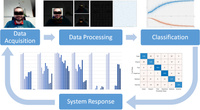Overview
One task of human machine interaction is to recognize emotions. Emotion recognition is the ability to interpret facial expressions and physiological reactions captured through different data acquisition systems, i.e., Sensors, and Cameras, into a corresponding emotional class by means of machine learning techniques. This system can be useful in the rehabilitation therapy, by helping in the treatment of people with autism spectrum disorder (ASD). A virtual world tailored to the individual, combined with an educative gaming platform which rewards emotional interactions, creates the appropriate atmosphere for the treatment and provides a positive outlook towards ASD patients' interactions and behavioral development.
Current research at ITeM
- Different neural network models (CNN, Graphical NN, Generative Adversarial N) are trained tested to obtain a robust model.
- Predictions are analyzed to validate the trained models.
- Development of a closed loop real-time system for predicting emotions.
- Improving robustness of neural network models through different approaches
- Signal processing and analysis
- Furtwangen University, Faculty of Industrial Technologies, Campus Tuttlingen
- Imsimity GmbH
- Graz University of Technology
- Obuda University
- Universität Klinikum Freiburg
- University of Canterbury New Zealand
